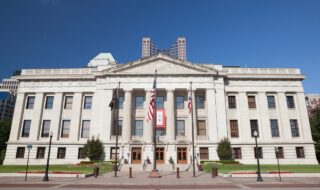September 7, 2025
Legislature in final week of its 2025 session
Welcome to the September 8-12 edition of the Main Street Minute from your small-business-advocacy team in Sacramento.
The Legislature
Today (September 8), the Legislature begins its final week of work for the 2025 half of its two-year session. Lawmakers will not return until January 5 next year for the 2026 half.
Among his many activities in the days ahead, NFIB Policy Director Tim Taylor will take part in a press conference this morning (September 8) in support of Senate Bill 72 (Caballero) at 10 a.m. in the Cactus Garden of the State Capitol.
“SB 72 establishes statewide water supply targets while requiring the State, water community, and stakeholders to follow through on comprehensive, long-term water supply solutions that will transform water management in California,” according to the website, CA Water for All.
The bill has passed both houses and is on its way to the governor for his decision.
Speaking of Senator Caballero
Her Senate Bill 690, another NFIB-supported measure, is now a two-year bill, which means its fate will be determined in 2026.
“This bill is necessary to stop the thousands of shakedown letters and lawsuits against California businesses of all sizes for typical business activities, like website analytics or online advertising that are already governed by the California Consumer Privacy Act (CCPA),” according to the letter of support NFIB and our coalition partners sent Senate Public Safety Committee Chairman Jesse Arreguin.
A full legislative recap of the 2025 session is coming shortly.
Big Ballot Initiative Coming November 2026
The Howard Jarvis Taxpayers Association (HJTA) is fighting “to close the court-created loophole in Proposition 13 that has allowed tax increases to pass with less than the required two-thirds vote when the taxes are proposed by a citizens’ initiative,” according a news release it issued in May.
“In 2017, the California Supreme Court’s decision in California Cannabis Coalition v. City of Upland created an ambiguity relating to whether the state constitution applies to local citizens’ initiatives in the same way it applies to measures placed on the ballot by a government body,” said HJTA President Jon Coupal in the release. “Since that time, we’ve seen the appellate courts allow all kinds of unconstitutional taxes – backed by tax-and-spend special interests – go into effect, costing Californians billions of dollars that they would not have had to pay if the courts followed the constitution.”
The state attorney general’s office has now cleared the HJTA’s Save Proposition 13 Act of 2026 for circulation. It now has until Jan. 12, 2026, to collect 874,641 signatures needed to make the November 2026 ballot.
If passed by the voters, it would, among other things, limit “voters’ ability to pass voter-proposed local special taxes by raising the vote approval threshold requirement for such ballot measures from a simple majority (over 50%) to two-thirds,” according to the secretary of state’s web site. You can read more about it here.
It will be up to NFIB California’s political action committee to decide if we endorse the ballot measure once it acquires enough valid signatures. Property taxes are a double concern for small business owners, affecting their businesses and homes.
Some factors that the PAC will weigh include:
— When members were asked in the 2024 NFIB Tax Survey, Do you own the building or property where your business is located (not including your primary residence)? 73% said Yes.
— When asked to rank property taxes in NFIB’s latest Small Business Problems & Priorities report, the concern came in 11th out of 75 issues.
— Asked on the 2016 state ballot, Should California tax commercial properties according to their market value while leaving limits on resident property taxes intact?, 87% of NFIB members said ‘No.’
— Asked on their 2017 state ballot, Should commercial (i.e. business) properties in California lose the protections of Proposition 13 and pay more in taxes? A resounding 95% of NFIB members said ‘No.’
— Asked the exact same question on their 2019 state ballot, Should commercial (i.e. business) properties in California lose the protections of Proposition 13 and pay more in taxes? No, said 94% of NFIB members.
Relatedly
A good example of what the ballot initiative is seeking to clarify and put a stop to are practices like the ones contained in Senate Bill 512 (Perez), which passed the Assembly on Thursday (September 4), is now back in the Senate for concurrence of Assembly Amendments.
According to the measure’s language, it “… would authorize the voters of any district that has authority to impose a transactions and use tax for transportation purposes to impose a retail transactions and use tax by an initiative measure.”
But that, however, “undermines the two-thirds vote requirement for special taxes,” according to a letter of opposition NFIB and its coalition partners sent to assemblymembers.
In an August 22 Assembly floor analysis of SB 512, legislators were informed that, “Since Upland [a 2017 state Supreme Court decision], several lower courts have been asked to consider whether local special taxes imposed through the initiative process require a two-thirds vote for approval. California Appellate Courts have considered seven such cases, and have uniformly concluded that the two-thirds vote requirement in article XIII C, section 2, subdivision (d) does not apply to special taxes proposed through the initiative process.”
NFIB Leadership Council members made opposition to SB 512 known to the lawmakers they visited on Leadership Day at the Capitol on August 26. Right now, it’s looking as if the bill is one step away from the governor’s desk.
Ahead
Select state agencies
California Air Resources Board (CARB) Evening Community Meeting: Clean Transportation Incentives for a Cleaner California, 5 p.m. to 7 p.m., September 16. Meeting will explain how CARB will spend money on projects related to zero-emission vehicles (ZEV) and improving air quality. More information, and link to register for web-only event, in CARB news release here.
California Energy Commission 50th Anniversary Symposium, 9 a.m. to 3 p.m., September 19, CNRA Auditorium, 715 P St., Sacramento. More information here.
What Others Are Saying, Writing
“I have to say that this audit has made it very clear what I have known for some time, and that is that Cal OSHA is not working,” she [Assemblymember Liz Ortega] said.
“Among the audits findings: Cal-OSHA performs more than 80% of its inspections by letter rather than in person; 32% of positions are unfilled despite adequate budget; and the agency keeps records in antiquated paper files filled with sometimes indecipherable handwritten inspection notes. Sometimes those inspection files are lost.”
Anastasia Boden, a civil rights attorney at Pacific Legal Foundation, reported on a couple of jaw-dropping overreach by the state in a guest editorial in The Orange County Register.
“One of the most jarring examples is the state’s recent crusade against a Southern California car wash. Last December, the California Labor Commission blindsided the owners with $810,000 in fines for alleged wage-and-hour violations. Before the owners could contest the charges or review any evidence, the Commission went straight to their bond company and demanded $300,000 in immediate payment.
“That single act triggered a cascade of destruction. The bond company paid but canceled coverage — and no other surety would touch a business with such large unresolved claims. Because California law requires car washes to have a bond in order to operate, the business was forced to shut down and lay off its workers — the same workers the state was claiming to protect.
“California’s arbitrariness even extends to bookstores. At the behest of Star Wars actor Mark Hamill, the state passed an autograph law requiring sellers to keep mounds of paperwork every time they sold a signed item, even a $5 paperback. For The Book Passage, a small independent bookstore in Northern California, that meant the end of author events, once the lifeblood of its business and the community. Fortunately, the store’s lawsuit and the industry’s outcry led the state to repeal the law the same year it was passed. But a law pitched as consumer protection nearly wiped out an industry that had operated successfully and safety for decades before.”
By the Numbers
Lots of moolah in those masticators.
“Several of the most compensated workers got the bulk of their ‘other’ income from lump sum pay, which includes one-time cash-outs like paid excess vacation or sick leave and legal settlements. For example, the supervising dentist for the Department of Corrections and Rehabilitation, George Soohoo, cashed out $1.2 million last year from lump sum pay, over 10 times his typical salary. That made Soohoo the third highest-earning state employee last year.”
Is beer using the prescription drug pricing model?
$14.99 for a beer at a Washington National’s game, the highest in Major League Baseball. $3 at a Colorado Rockies game, the lowest. Here at home: $9 at a San Francisco Giants game; $7 at a Dodgers and A’s games; $5 at a Padres game; and $4.50 at an Angeles game.
Should NFIB ask its members on their next ballot if the Legislature should pass a BYOB for sporting events. Above information from an internet meme.
May the reduced force be with you
Reports the San Francisco Chronicle, “Salesforce cut 4,000 customer support roles this year after deploying artificial intelligence agents to handle a growing share of the company’s work, CEO Marc Benioff said in a new podcast. Speaking on The Logan Bartlett Show ahead of Labor Day weekend, Benioff said the San Francisco software giant reduced its support staff by nearly half. ‘I’ve reduced it from 9,000 heads to about 5,000 because I need less heads,’ he said in the episode released Friday.”
Calendar
— September 9: California turns 175 years old
— September 12, 2025-January 5, 2026: Interim recess of the 2025-2026 session of the California State Legislature
— October 15: Last day for governor to sign or veto bills passed before September 12.
National
Highlights from Federal Government Relations Principal Louis Bertolotti’s weekly report
— NFIB Chief Economist Bill Dunkelberg published an op-ed in Forbes regarding small business interest rates.
— NFIB released Episode 69 of the “Small Business Rundown” podcast, featuring John Byers, Chief of Staff for U.S. Representative August Pfluger, on the best practices for connecting with members of Congress.
— NFIB released the August Jobs Report, which was covered by the Wall Street Journal. The findings showed that 32% of small business owners reported job openings they could not fill in August, down 1 point from July.
Next Main Street Minute: September 15. All Main Streets Minutes can be found on the NFIB website here. Pull down the California tab in the upper-right-hand corner.
NFIB is a member-driven organization advocating on behalf of small and independent businesses nationwide.
Related Articles














